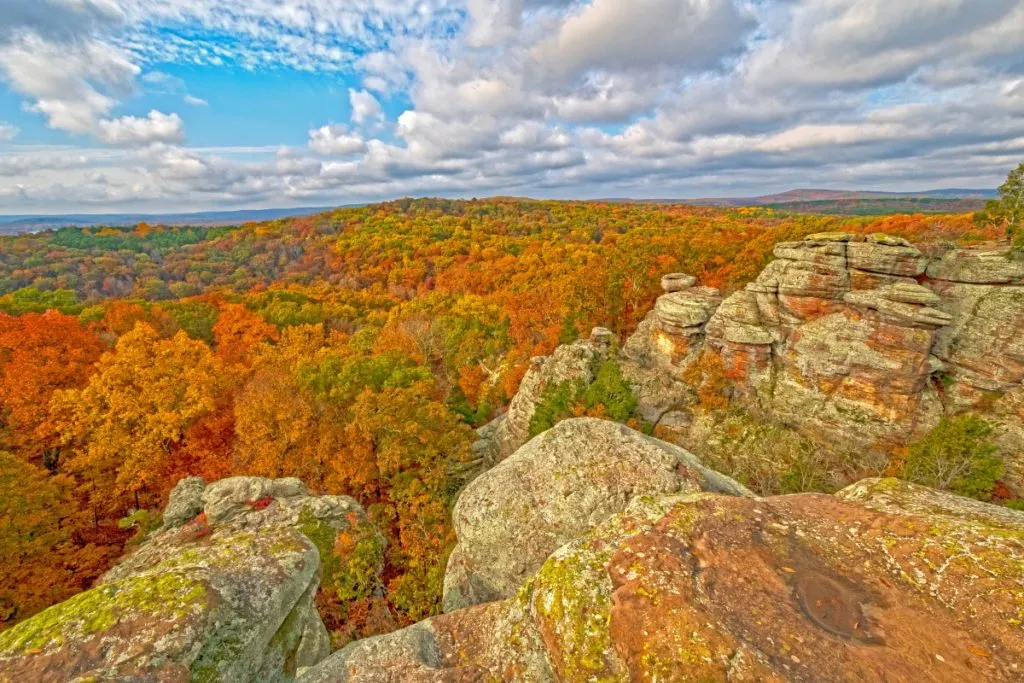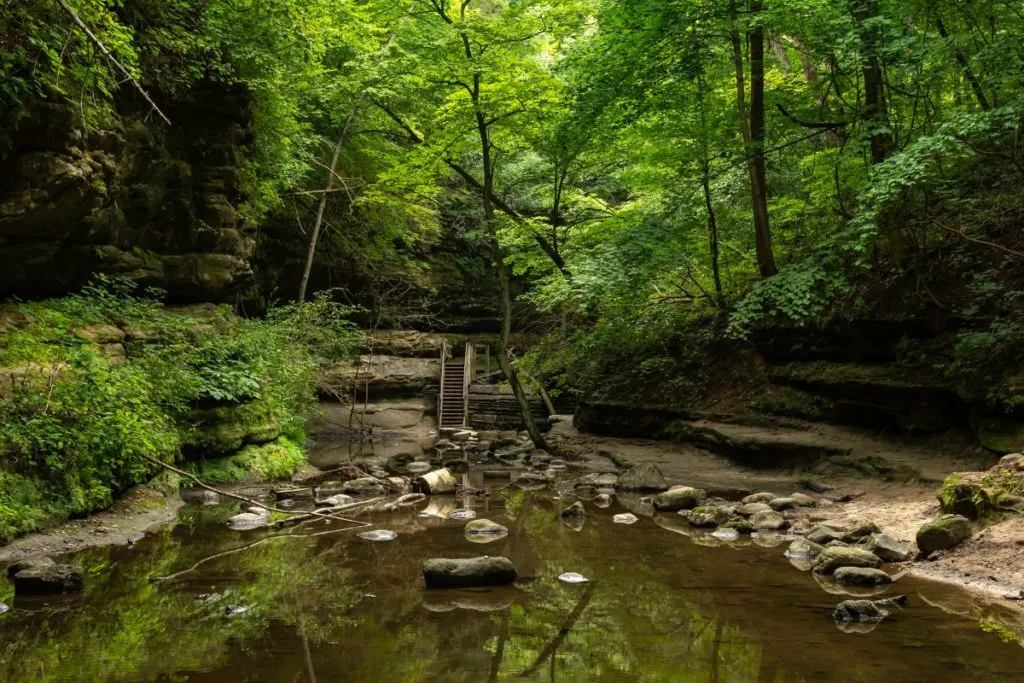As an Amazon Associate, I earn from qualifying purchases with no additional costs for you.
Illinois is a modest rockhounding state famous for its fluorite and geode specimens. Though not on the top list, it does have its fair share of exciting minerals, crystals, gemstones, rocks, and especially fossil specimens that can be found around the state.
The best locations in Illinois are the banks and tributaries of the Mississippi River near Niota, the Mazon River gravels, some regional mining dumps and quarries, and the Keokuk geode beds near Hamilton. You can find agate, geode, fluorite, diamonds, pyrite, and jasper, among other things.
Illinois does shine in its diversity of fossils, and quite a few rockhounding locations are worth exploring. Here is where you should go rockhounding in Illinois and what you may find!

If you are interested in checking out the best rockhounding book about rockhounding in Illinois, you can find it here (Amazon link).
Best Rockhounding Sites in Illinois
Some of the best rockhounding sites in Illinois are the Mazon and Mississippi Rivers, Hamilton, Crystal Glen Creek, Spillman Creek, Terre Haute, North Aurora, Galena, Fayville, Thebes, Cave-in-Rock, Minerva Mine, Rosiclare, McKee Creek, and Sparta, among many other places.
Let’s look at some of these sites and see where exactly you should go rockhounding and what you might find!
Crystal Glen Creek
Crystal Glen Creek is among the best rockhounding locations in Northern Illinois. The exposures in this creek are amazing! You can find an extreme diversity of geodes. Some geodes contain aragonite, others barite and calcite, and you can even find goethite geodes, pyrite, quartz, selenite, and other varieties.
Spillman Creek
Spillman Creek is another abundant geode area in Illinois where beautiful and big geode specimens can be found. Here, you can discover calcite geodes, pyrite geodes, chalcedony geodes, sphalerite geodes, and even quartz-containing geodes.
Terre Haute
Terre Haute, located in Illinois, is a remarkable destination renowned for its diverse array of fossils, primarily Mazon Creek fossils.
In this region, known for its gravel deposits, avid collectors may come across Tully monster fossils, which hold the distinction of being the designated state fossil of Illinois. Additionally, they may also discover plant fossils and several other invertebrate fossils.
North Aurora
In the North Aurora area, rock collectors might head to the Conco Quarry and try out their luck at finding various mineral specimens. Some of the things that explorers might find are calcite, bornite, chalcopyrite, and pyrite specimens.
Hamilton
Hamilton is also among the best rockhounding locations in northern Illinois. In the area gravels, explorers might find agate, jasper, and chalcedony geodes.
The gravels south of Keokuk Bridge are also famous for their geode specimens. At the Hamilton Quarry, the top strata, you can also find sphalerite, calcite, pyrite, and marcasite geode specimens.
BTW: Do you want to know more about rock and mineral identification? The books listed below are the best ones you can find on the internet (Amazon links):
- Smithsonian Handbooks: Rocks & Minerals
- Gemstone & Crystal Properties (Quick Study Home)
- Ultimate Explorer Field Guide: Rocks and Minerals (National Geographic Kids)
Rockhounding in Southern Illinois
Southern Illinois is more prosperous in rockhounding locations and the things you may find in the northern region. Some of the best sites in southern Illinois include Fayville, Mississippi River, Cave-in-Rock, Minerva Mine, Rosiclare, Sparta, Edwards County, Thebes, and Elizabethtown.
Cave-in-Rock
Cave-in-rock is one of the best places to rockhound in southern Illinois. There are a lot of rocks, gemstones, and crystals in the mines in this area. Many people like to come here to find fluorite, barite, calcite, cerussite, chalcopyrite, galena, pyrite, smithsonite, and witherite.
Rosiclare
The area mines around Rosiclare in southern Illinois are excellent to find some high-quality crystals. With a bit of luck you can find calcite crystals, purple, blue, yellow, and even clear fluorite specimens, and even sphalerite.
Minerva Mine & Fayville
The Minerva Mine No.1 is another excellent rockhounding location, as enthusiasts may find barite, strontianite, or alstonite. However, the area stream gravels in Fayville may yield some diamonds, though they are rare. Yet, you will definitely find agate or jasper.
TIP: You might be interested in useful tips on how to find rocks in nature if you just start with rockhounding. Check out the ultimate guide in the article below:
8 Tips On Finding Gemstones In Nature (Rivers & Creeks)
What Kind of Rocks Are Found in Illinois?
Illinois contains a variety of rocks. Some of the most popular geodes are diverse minerals and crystals, such as obsidian, Geodes, agates, flint, yooperlites, chert, coal, limestone, shale, basalt, granite, or shale.
| Rock | Location |
|---|---|
| Geodes | Crystal Glen Creek, Hamilton Quarry, Dallas City, Spillman Creek, McKee Creek |
| Obsidian | – |
| Agate | Hamilton, Bishop Hill, Thebes, Fayville |
| Flint | Union County, Alexander County |
| Chert | Shawnee Hills, Illinois River Valley |
| Yooperlites | Chicago, Lake Michigan, Point Betsie |
Illinois has several beautiful geodes. There are several lovely chalcopyrite, calcite, and marcasite geodes near Dallas. In Hamilton, the gravel south of Keokuk Bridge is similarly prosperous in geodes. The top strata of the Hamilton Quarry contain geodes made of marcasite, pyrite, calcite, and sphalerite.
Crystal Glen Creek is also a fantastic place to find geodes. You can find various types, such as aragonite, barite, calcite, dolomite, quartz, selenite, goethite, and pyrite variants. Nauvoo’s area gravels and streams also contain geodes and those of Niota.
You can also find geodes at Tyson Creek, just 2 miles south of Niota. At Spillman Creek, calcite, pyrite, chalcedony, quartz, and sphalerite geodes are found.
The Mississippi River, specifically the banks and shores west of Illinois, contain amethyst, chalcedony, and quartz geodes, while in the McKee Creek, just south of Perry, you might find calcite or sphalerite geodes.
Most of the obsidian specimens found in Illinois aren’t native to the state, as sedimentary rocks dominate the region. What obsidian has been found in Illinois comes in raw rock material and artifacts, which were transported in the state somehow.
The obsidian found in the lower Kaskaskia River regions and other western Illinois locations are examples of this.
Finding agates in Illinois is relatively easy in comparison. The area gravels in Hamilton are an excellent spot to search for them.
Agate can also be found along the Mississippi River’s banks at Cordova and in the Bishop Hill area. Agates are abundant in the Mississippi River’s stream gravels and bars around Thebes and Fayville.
To find Flint in Illinois, you should go to either Union County or Alexander County. There, you might be able to find flint, or you can try your luck in Morrison City or the surrounding regions, but generally, flint is found in the southern parts of the state or at the border with Missouri.
This is also the case if you want to find chert in Illinois. Some other great locations include the Shawnee Hills in the southern parts of Illinois or the giant limestone bluffs that sit at the lower reach of the Illinois River Valley.
If you want to find yooperlites in Illinois, make sure to have the proper equipment with you! The best place to find yooperlites in this state is near Lake Michigan, especially near the Chicago area or the Point Betsie Area.
TIP: Although some fortunate rockhounds are able to find treasures without any research or planning, luck favors rockhounds who are prepared. Find out more in the article below:
12 Common Rocks & Minerals You Can Find in Illinois
What Gemstones Can Be Found in Illinois?
Illinois isn’t known for its gemstone variety or abundance. However, there are some gems that you may find in this state if you search in the right places. Some of the more popular gemstones you can find include amethyst, jasper, pyrite, rubies, diamonds, calcite, siderite, or barite.
| Gemstone | Location |
|---|---|
| Amethyst | Calhoun County |
| Ruby | – |
| Jasper | Hamilton, Bishop Hill, Fayville, Thebes |
| Pyrite | East Brooklyn, North Aurora, Cave-in-Rock, Sparta |
Finding proper gemstones in Illinois is quite challenging. For example, if you want to search for amethyst, you may be able to see it in Calhoun County. However, other areas haven’t reported amethyst findings.
The same goes for rubies. Rubies are generally rare worldwide, yet some believe they might reside in Illinois as well. If this is true, then the most likely areas where you might find them are in the old mines and queries.
When it comes to the gemstone jasper and pyrite, things are more straightforward. You can find Jasper in Illinois in Hamilton, where the area has gravel. You can also try your luck at Bishop Hill, Fayville, the stream gravels, or Thebes.
TIP: Check out the article below for a complete guide on rockhounding on Lake Michigan beaches:
Guide: Best Rock Hunting Beaches on Lake Michigan
What Types of Minerals Are Found in Illinois?

When it comes to Illinois mineral diversity, things take a different turn. Some minerals that you can find in this state include gold, quartz, smithsonite, diamond, marcasite, chalcopyrite, galena, barite, siderite, dolomite, calcite, fluorite, strontianite, and many others.
| Mineral | Location |
|---|---|
| Gold | Spoon River, Illinois River, Mississippi River, |
| Quartz | Illinois River, Spillman Creek, Crystal Glen Creek |
| Diamond | Fayville, Mt. Vernon |
| Galena | Cave-in-Rock, Galena |
Gold doesn’t appear to occur in mineral deposits anywhere in Illinois, and as such, your only luck in finding gold is through panning.
Some of the best sites to pan for gold in Illinois are the Sangamon River Valley, Macon County, Mississippi River Valley, Henderson County, Illinois River Valley, and Spoon River Valley, Fulton County.
Though quartz is a popular mineral found in most states, things are a bit trickier when it comes to Illinois. You can find quartz in the Illinois River, possibly the Mississippi River, or the Spillman Creek.
Things also stand a bit bleak when it comes to finding diamonds in Illinois. You can try your luck in Fayville, the area of stream gravels, where diamonds were found on rare occasions. Occasionally, diamond specimens were found at about 9.5 miles west of Mt. Vernon in creek gravels.
TIP: Quartz minerals have a lot of different varieties. Do you know what their value is? Find it out in the article below:
How Much Is Quartz Worth? Value for Common Quartz Varieties
What Crystal Can You Find in Illinois?
The crystal diversity and quantity of Illinois are relatively minimal. However, some crystal specimens can be found. The most popular include fluorite, calcite crystals, cerussite, bornite, witherite, alstonite, strontianite, aragonite, and sphalerite.
| Crystal | Location |
|---|---|
| Fluorite | Cave-in-Rock, Rosiclare, |
| Calcite Crystals | Rosiclare, McKee Creek, North Aurora |
| Cerussite | Galena, Cave-in-Rock |
To find fluorite in Illinois, you should head to the southern parts. You can find fluorite in the deposits near Cave-in-Rock. Another excellent place is Rosiclare.
The area mines in this region contain various fluorite specimens that differ in color. Some are clear, while others are blue, purple, and even yellow.
What Kind of Fossils Are Mostly Found in Illinois?
The most commonly found fossils in Illinois include brachiopods, blastoids, bryozoans, cephalopods, conodonts, corals, crinoids, cystoids, echinoderms, foraminifera, gastropods, graptolites, Horseshoe crabs, insects, marine worm jaws, trilobites, vertebrate fossils, sponges, and plant fossils.
Some of the best sites to find fossils in Illinois include Mazon Creek, Mazon River, Niota, Terre Haute, and Sparta. Generally, the northern parts of the state are the most abundant in fossils. Pyritized gastropods can be found at the Rapatee Strip Mine.
To find shark teeth, possibly even megalodon teeth, you need to find rocks from the Ordovician or Silurian periods in the quarries of the Chicago area or the Mississippi River bluffs of northwestern Illinois, such as the Rock Island area.
When it comes to finding artifacts and relics in Illinois, such as arrowheads, your best bet is the Illinois River, or the Mississippi River, and generally, lakes and creeks. Farm fields are also a great place to start searching. However, make sure to ask permission.
Where to Find Sea Glass in Illinois?
If you want to find seaglass in Illinois, you can head to the Illinois Beach State Park. You can find sea glass near Chicago in Montrose Beach, Loyola Beach, Kathy Osterman Beach, 63rd St Beach, Oak Street Beach, Foster Avenue Beach, and North Avenue Beach.
TIP: Even if you do not find sea glass on the Illinois beaches you can make your own sea glass at home! Check out the step-by-step guide in the article below:
Step-by-Step: Making Sea Glass With & Without Rock Tumbler
FAQ About Rockhounding in Illinois
Sill did not find the answer to your questions about rockhounding in Illinois. Find frequently asked questions in the section below:
Is Rockhounding Legal in Illinois?
Rockhounding is legal in Illinois. However, you should always make sure to stay away from private lands. Though some places are designed for rockhounds, and they have to pay a fee or not to collect, others are off-limits or require a permit. Always do your research ahead of time.
What is Illinois State Rock?
Illinois does not have an officially designated state rock. Though the state is filled with various sedimentary rocks, none were selected. Geodes are pretty common in Illinois, and it might be possible to consider them. However, yooperlites can also be found here.
What is Illinois State Fossil?
Illinois’s officially designated state fossil is the Tully Monster, Tullimonstrum gregarium, since 1989. Although not a monster, this small invertebrate marine animal had no shell or backbone and was less than six inches long. It lived in the Pennsylvanian Period, 340 to 280 million years ago.
What is the State Gemstone of Illinois?
Illinois doesn’t have an officially designated state gemstone, which is poor in gemstones. It only has a designated formally state mineral, fluorite, since 1965 and a designated formally state fossil, the Tully Monster, Tullimonstrum gregarium, since 1989.
Conclusion
Despite its initial appearance, Illinois offers a rewarding experience for visitors. Upon entering the state, one will discover diverse fossil specimens, geodes, fluorite, and other minerals and rocks, which are highly valuable for rock enthusiasts.
TIP: Do you know what tools you need for rockhounding? Check out all necessary rockhounding tools in the article below:
The Complete Guide: All Tools You Need for Rockhounding
